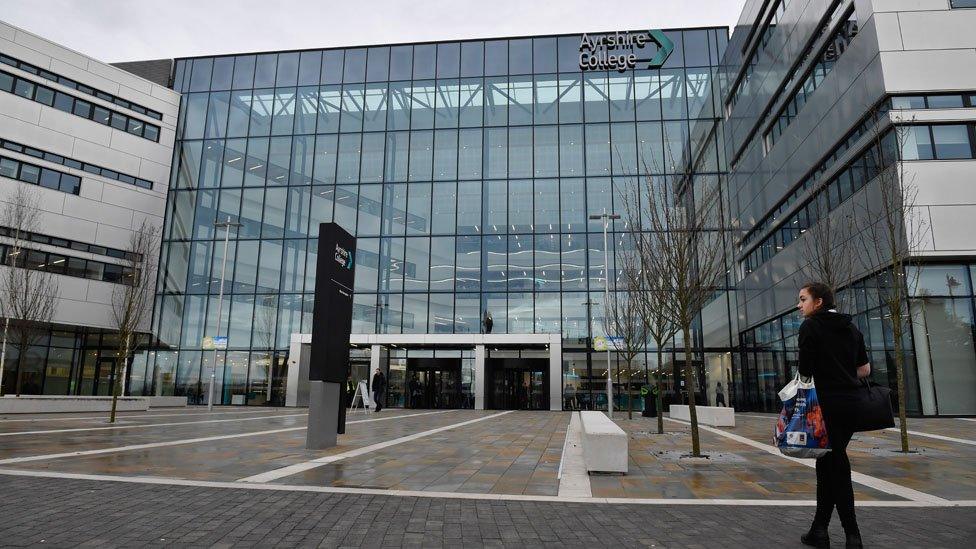Financial watchdog warns of financial pressures on colleges
- Published
- comments

Under pressure: City of Glasgow College and Scotland's 25 other colleges are facing increased cuts
The financial challenges facing Scotland's colleges are intensifying, according to the public spending watchdog.
Audit Scotland says most colleges are forecasting deficits in the next five years.
The Scottish government says it has invested heavily in colleges.
Last week colleges warned that an improved pay offer to settle an industrial dispute would need to be paid for by cuts and savings.
The watchdog said an increase in government funding to colleges would cover only the costs of making staff pay and conditions consistent across the sector.
Tighter budgets
Caroline Gardner, the Auditor General for Scotland, said: "Colleges are increasingly dependent on public funding to cover their costs, and it is likely that the gap between their income and spending will continue to widen without action.
"Tighter budgets make financial planning even more important. Colleges and the Scottish Funding Council need to do more to ensure they are as well-prepared as possible to deal with ongoing pressures."
The report also highlights apparent variations in how well different colleges perform.
Overall student numbers have increased and the sector exceeds its learning activity targets. But there are wide variations in measures of student success - for instance the numbers who actually complete their course or get a job.
The report also said there was room for clearer reporting by the Scottish Funding Council on colleges' performance, including around student satisfaction figures.

The Auditor General says Scotland's colleges will see the gap widen between income and spending
Further Education Minister Richard Lochhead said: "Audit Scotland finds that the college sector reported a small, but improved, underlying financial surplus in 2017-18. The Scottish Funding Council (SFC) assists colleges with their medium and long term financial planning and provides support as required.
"We are also working with the sector to diversify income streams. The SFC will produce a medium term capital investment strategy for the college estate which will provide valuable evidence to determine future investment.
"Since 2007, the Scottish government has invested more than £7bn in colleges, with over £600m this financial year. In real terms we've allocated over £810m to capital projects including new campuses and buildings.
"More than 11,000 more full-time college students successfully completed their course last year compared to a decade ago, with improving attainment rates for students from the most deprived areas over the last six years."
Colleges received £606.5m in Scottish government revenue funding in 2019/20, compared to £588.9m in 2018-19.
Industrial action
This is a 1% real terms increase to fund the cost of harmonising staff pay and conditions.
Until a few years ago, different colleges had significantly different pay structures and terms and conditions of employment.
Over the past few months, colleges have been hit by industrial action over pay by lecturers. A deal in principle to settle the dispute was reached last week.
Colleges made it clear that they did not want more government money simply to raise wages - they said that they would want any additional investment in the sector to be spent on things which may help improve the experience of students - such as improved facilities.

College lecturers staged a series of strikes in recent months
Commenting on the report, Shona Struthers, chief executive of Colleges Scotland, said: "Scotland's Colleges 2019 confirms that colleges continue to operate in narrow financial margins and face significant challenges. The underlying financial position of many colleges is concerning, as almost half of the 26 colleges are forecasting recurring financial deficits by 2022-23.
Increasing investment
"The report also highlights that there is currently insufficient capital investment to properly address the needs of the sector, so it is critical that the upcoming Comprehensive Spending Review delivers on revenue and capital investment for college learners by safeguarding the sector which trains, qualifies, and upskills the workers and supports inclusive economic growth.
"The Scottish government is increasing revenue investment in colleges, which we welcome, but this additional funding is being used to cover the growing costs from harmonising pay, terms and conditions across the sector.
"EIS-FELA members currently being balloted on whether to accept the deal being offered by colleges should recognise that all that additional money is coming from colleges making cuts elsewhere. "
- Published31 May 2019

- Published21 June 2018
